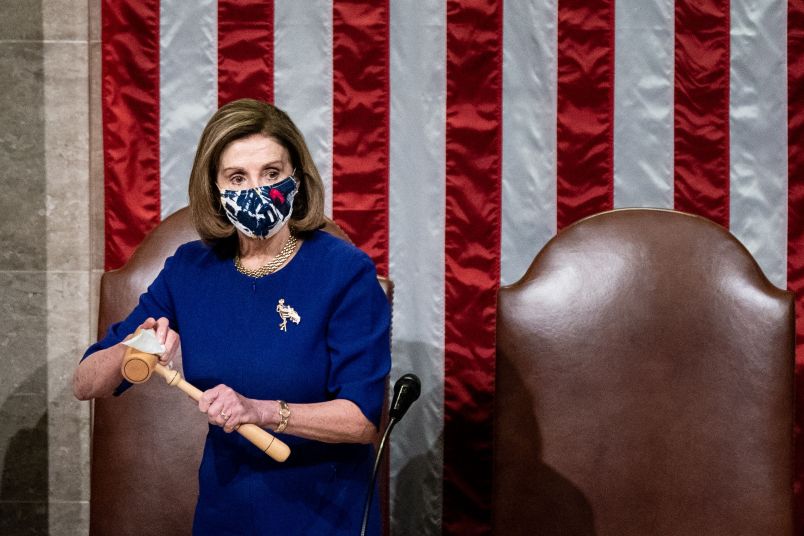Speaker of the House Nancy Pelosi (D-CA) made clear on Thursday that Congress will not let Republicans yank a bipartisan infrastructure bill away at the last minute.
She told reporters that the House would not take up a bipartisan infrastructure bill until the Senate also passes a reconciliation bill.
“We will not take up a bill in the House until the Senate passes the bipartisan bill and a reconciliation bill,” Pelosi said.
Budget reconciliation has long been considered Democrats’ best option for passing their priorities through the Senate without having to overcome the 60-vote threshold imposed by a GOP filibuster.
Pelosi’s move may allow the House to avoid a dreaded Lucy-and-the-football scenario, in which a dramatically reduced infrastructure bill would pass the Senate with bipartisan support but without a firm commitment from centrist Democrats to pass a separate larger package via reconciliation without GOP help.
Pelosi’s commitment means that Senate Democrats will have to agree among themselves on a reconciliation deal as they continue to negotiate the bipartisan infrastructure package.
A bipartisan group of 20 Senators acknowledged on Wednesday that time was running out on a deal, and said last night that the two sides had agreed on a framework for the legislation.
Sen. Joe Manchin (D-WV) has demanded that Democrats reach a bipartisan deal on infrastructure. He said on Wednesday that he would be open to passing a second bill — likely addressing human infrastructure needs — through budget reconciliation.
Pelosi emphasized that “there ain’t going to be an infrastructure bill unless we have the reconciliation bill passed by the United States Senate.”
Manchin has so far been the most vocal holdout for demanding that a bipartisan bill be passed, and has not shied away from expressing opposition to various portions of Biden’s proposals. But other influential Democratic senators have also suggested that they may be opposed to key planks in some of the President’s plans.
“I’m not sure raising the capital gains taxes to the ordinary rates is the right answer,” Sen. Mark Warner (D-VA) said in an interview with Bloomberg last month. “There is a sweet spot where you can raise capital gains, still have a differential between capital gains and ordinary income, and still generate more revenue.”
Questions over what a reconciliation bill might look like also come after White House suggested splitting the infrastructure package into two halves: a physical infrastructure bill called the American Jobs Plan, and a human infrastructure proposal called the American Families Plan which focuses on child care, paid leave, and community college.
Manchin told NBC on Wednesday that he supported using the reconciliation process for those proposals, and for making changes to the tax code.
“Republicans have drawn a line in the sand on not changing anything, and I thought the 2017 tax bill was a very unfair bill, and weighted to a side that basically did not benefit the average American. So I voted against it,” Manchin said. “I think there are some adjustments that need to be made.”
Pelosi made it as clear as possible in the presser that the House would not act until the Senate found a way to deliver a reconciliation bill. That includes a scenario in which bipartisan talks fall through.
“If there is no bipartisan bill, then we’ll just go when the Senate passes a reconciliation bill,” she said.







Go Nancy!
This, too:
https://www.washingtonpost.com/politics/pelosi-announces-a-select-committee-will-investigate-the-jan-6-attack-on-the-capitol-by-a-pro-trump-mob/2021/06/24/55497282-d4f5-11eb-ae54-515e2f63d37d_story.html
I like it. That’s the way to go. Pass your bipartisan piecemeal bullshit, then pass the rest of it in reconciliation, and then we’ll move. Nice!
Those fuckers ALWAYS forget that she’s tougher and smarter than they are.
Check…then mate.
Nancy is a national treasure.
They should keep hammering this point home: “We are willing to negotiate in good faith with adults of the Republican Party. Unfortunately, there do not appear to be any adults remaining.”